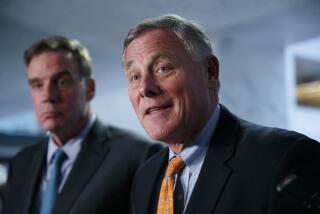Sen. Robb Not Indicted in Taping of Rival’s Call : Inquiry: Grand jury declines charges, but case may further tarnish image of former presidential contender.
- Share via
WASHINGTON — A federal grand jury Tuesday refused to indict Sen. Charles S. Robb (D-Va.) on charges of lying to investigators and conspiring to violate wiretap laws in a political feud with his archrival, Democratic Gov. L. Douglas Wilder.
The surprise decision, following an 18-month investigation, was announced tersely by the Justice Department, giving rise to speculation that federal prosecutors had pushed hard for the indictment in a closed-door grand jury meeting.
Robb told reporters outside his Washington office: “I’ve said all along I knew this was going to end, I just didn’t know when.” And, he said, “I look forward to getting on with the job I was elected to do.”
But political experts said that Robb, 53, once considered a presidential contender as the handsome son-in-law of the late President Lyndon B. Johnson, still must contend with a reputation tarnished by persistent reports of womanizing and attending drug parties. He may face a battle next year to keep his Senate seat, some said.
“This is a respite for him but not vindication by any means,” said Larry J. Sabato, a University of Virginia professor of political science who has written about Robb’s career. “Unfortunately for him, his reputation in this state as a scoundrel is still very much intact.”
Another source, who asked that his name not be used, said: “I’ll be greatly surprised if Robb is not challenged for renomination by his own party next year.”
Robb had denied wrongdoing in the case, which involved the taping of a cellular phone conversation between Wilder and a political supporter in 1988, when Robb was governor and Wilder was lieutenant governor. In the conversation, Wilder boasted that Robb’s political career was finished because of his sullied reputation. Robb was elected later that year to the Senate.
A grand jury in Norfolk was investigating charges at the time that Robb ordered a transcript of the phone call to be leaked to the press to embarrass Wilder, with whom he long has feuded. Robb’s aides reportedly believed the transcript would show that Wilder was trying to undercut their boss.
Robb, who testified twice before the grand jury, said publicly that he was aware of the recording and transcript but told his staff to keep the material confidential. Three of Robb’s former staff members pleaded guilty to misdemeanors in the case, however, and government sources said that all three had been prepared to testify against the senator if he had been indicted.
Robb, who first testified in closed session in late 1991, voluntarily appeared a second time last month before the grand jury to protest his innocence. But the Washington Post quoted government sources as saying that prosecutors were unconvinced by his protestations.
Robb said last month that he had answered all the grand jury’s questions but still expected to be charged.
Details of what took place in the grand jury room could not be learned, but federal rules require 12 members of a 23-member jury to favor an indictment before it can be returned.
While refusing to indict Robb, grand jurors Tuesday handed up a three-count indictment charging Bruce Thompson, a Virginia Beach businessman, with obtaining the Wilder tape recording, disclosing the contents to Robb’s staff members and attempting to persuade two people to testify falsely to investigators.
Robb has been enmeshed in national controversy since acknowledging two years ago that he engaged in indiscretions with model Tai Collins, a former Miss Virginia, while serving as Virginia governor. He said that she gave him a massage in a New York hotel suite as they shared a bottle of wine. But he denied charges later aired on a network television show that he was a philanderer and had socialized with drug users.
Times staff writer William J. Eaton contributed to this story.
More to Read
Get the L.A. Times Politics newsletter
Deeply reported insights into legislation, politics and policy from Sacramento, Washington and beyond. In your inbox twice per week.
You may occasionally receive promotional content from the Los Angeles Times.










